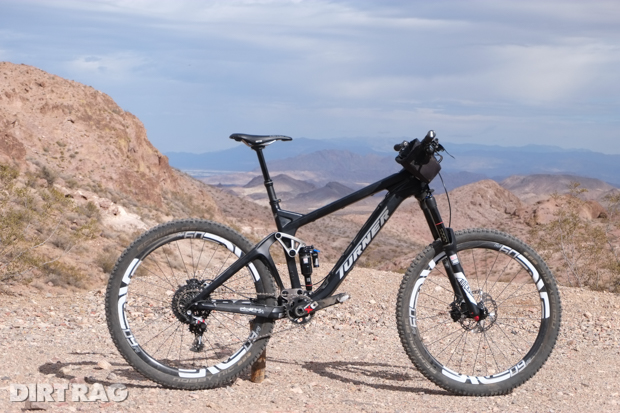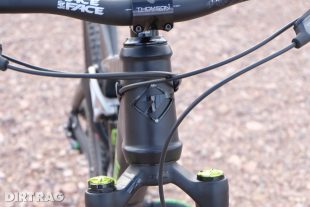Interbike: Turner RFX v4.0 First Ride
Originally posted on September 17, 2015 at 11:29 amThe RFX has been out of the Turner lineup since 2007 but returns with a vengeance as a fully modern carbon fiber all-mountain bike.

The Turner website is already loaded up with prices and build kits, with complete bikes starting at $4,573 for SRAM GX, up to $8,718 with XTR and Enve wheels. Frames are $2,995, and an “upgrade kit” consisting of frame, headset and Pike RCT3 Solo fork is an even $3,400. The bike I rode was a mash-up of parts Turner had lying around, but was a solid mix, including Enve M60 rims, Pike fork and Monarch Plus rear shock, KS dropper and Thomson bar and stem.



Look closely at the pictures above. Do you notice anything (other than the prototype DVO suspension bits)? All cable routing is external. Take note, rest of the bike industry. The routing is clean, adaptable, and simple. No holes in the frame, no rubber cable adapters that fall out every ride, no service frustrations. And the frame has well hidden front derailleur mounts rather than the more typical direct mount. The PF30 bottom bracket shell is another story. I guess we can’t have it all.
The new frame uses the proven dw-link suspension to control the 160 mm of rear travel. Geometry numbers are in the middle ground for bikes like this today, with a not too slack or steep 66-degree head angle, not too long 24.4 top tube in the large, 17.2-inch chainstays, and 13.4-inch bottom bracket height.
The Ride
David Turner is a bike guy, through and through, and from the first look in person at the new RFX, it looks like a serious and well thought out bike. Even with less-than-ideal tires, and narrower than I wanted handlebars, I had a great ride on the RFX.
Seated climbing is completely neutral, but getting out of the saddle can still create bob, something only partially mitigated with the platform lever on the rear shock. I’d like to spend some time trying to tune the rear shock a bit better to combat this, but really, other than climbing up steep sections of gravel road, I never thought about it.
On rolling sections of trail, the RFX feels quite neutral for such a bike bike. Not as playful and poppy as a Santa Cruz Nomad, but not overly stable or staid, either. In other words, it went about its business with a predicatble attitude and responded well to smooth or more spastic rider inputs.
I didn’t have time to shuttle up to the downhill course at Bootleg Canyon, so I didn’t really get a chance to open it up, but I don’t expect to see this being anything less than a ripper as speeds increase even as the riding position felt all-day comfortable to me. The dw-link disappears on the trail, with no mid-stroke wallow, and effective anti-squat to control bob, although that same aggressive anti-squat could cause the rear tire to scramble for traction more often than I expected.
The FSA headset Turner uses can be swapped to a offset model, for head angles of 65 or 67 degrees if the stock 66 degrees is too slack or steep for your riding style/skills and riding area. No aluminum frame version is planned at this time.

As one of many 160 mm bikes released for 2016, this bike stacks up well against the best offerings on the market. We look forward to more saddle time on this newest Turner.